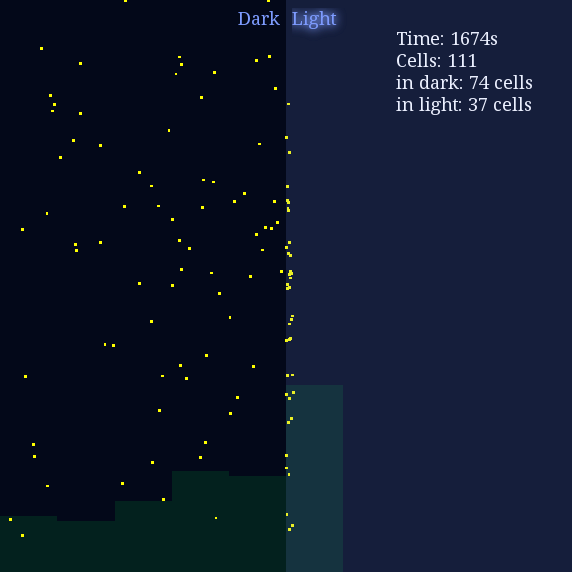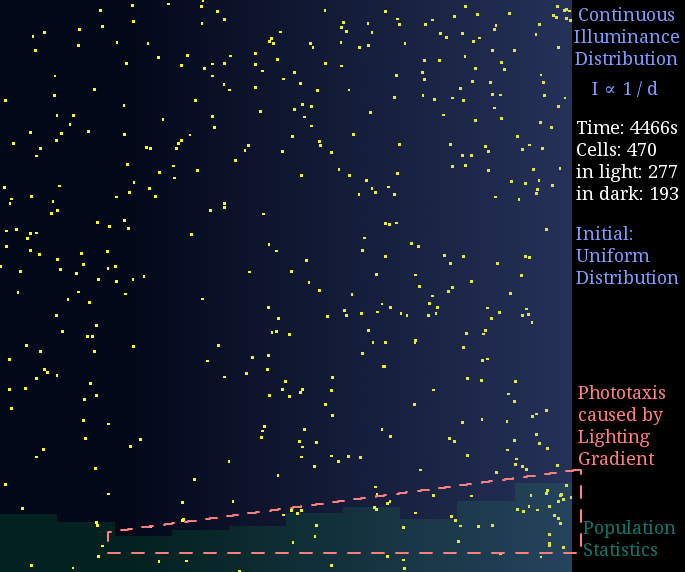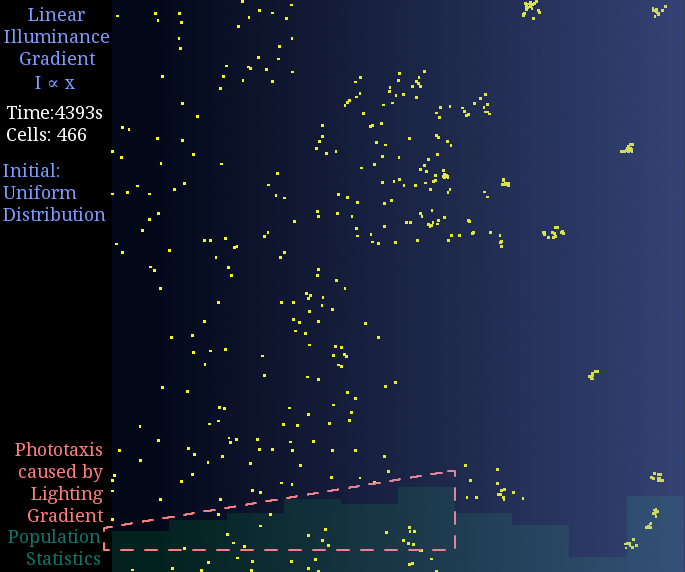Team:Peking/Modeling/Phototaxis/Stochastic
From 2012.igem.org
| Line 16: | Line 16: | ||
<h3 id="title2">Stochastic Simulation</h3> | <h3 id="title2">Stochastic Simulation</h3> | ||
<p> | <p> | ||
| - | As in previous introduction, it is the component of CheY<sub>P</sub> that directly influence the motors and thus influence the mobility of the cell. In detail, CheY<sub>P</sub> can interact the flagellar motor to induce CW (clockwise) rotation. When flagellar motors rotate CCW (counterclockwise), they form a bundle to generate a force similar to a worm wheel. However, if some of the flagellar motors rotate CW (clockwise), the bundle breaks and the cell keeps tumbling. After in CW state for about 0.43s,<sup><a href="#ref2" title="Dependence of | + | As in previous introduction, it is the component of CheY<sub>P</sub> that directly influence the motors and thus influence the mobility of the cell. In detail, CheY<sub>P</sub> can interact the flagellar motor to induce CW (clockwise) rotation. When flagellar motors rotate CCW (counterclockwise), they form a bundle to generate a force similar to a worm wheel. However, if some of the flagellar motors rotate CW (clockwise), the bundle breaks and the cell keeps tumbling. After in CW state for about 0.43s,<sup><a href="#ref2" title="Vladimirov, N., et al.(2008). Dependence of bacterial chemotaxis on gradient shape and adaptation rate. PLoS Comput. Biol., 4: e1000242">[2]</a></sup> the flagellar motors return to CCW state and reconstruct the bundle to make the cell run. Since the CW state is triggered by CheY<sub>P</sub> molecule stochastically and is independent from its state history, this event is a typical <a href="/Team:Peking/Modeling/PoissonProcess">Possion Process</a> whose average frequency is determined by the concentration of CheY<sub>P</sub> with:<sup><a href="#ref3" title="Cluzel, P., et al.(2000). An ultrasensitive bacterial motor revealed by monitoring signaling proteins in single cells. Science, 287: 1652: 1655">[3]</a></sup> |
</p> | </p> | ||
<div class="floatC"> | <div class="floatC"> | ||
| Line 48: | Line 48: | ||
</li><li> | </li><li> | ||
(8) In SPECS model, the running direction after tumbling is independent from previous direction; | (8) In SPECS model, the running direction after tumbling is independent from previous direction; | ||
| - | while in RapidCell model, the new running direction performs as:<sup><a href="#ref2" title="Dependence of | + | while in RapidCell model, the new running direction performs as:<sup><a href="#ref2" title="Vladimirov, N., et al.(2008). Dependence of bacterial chemotaxis on gradient shape and adaptation rate. PLoS Comput. Biol., 4: e1000242">[2]</a></sup> |
</li></ul> | </li></ul> | ||
<div class="floatC"> | <div class="floatC"> | ||
| Line 66: | Line 66: | ||
<td>Parameter</td><td>Value</td><td>Unit</td><td>Description</td><td>Source</td> | <td>Parameter</td><td>Value</td><td>Unit</td><td>Description</td><td>Source</td> | ||
</tr><tr> | </tr><tr> | ||
| - | <td>v<sub>0</sub></td><td>20</td><td>um/s</td><td>running speed</td><td><sup><a href="#ref4" title="Chemotaxis in Escherichia coli analysed by | + | <td>v<sub>0</sub></td><td>20</td><td>um/s</td><td>running speed</td><td><sup><a href="#ref4" title="Berg, H. C. & Brown, D. A.(1972) Chemotaxis in Escherichia coli analysed by three-dimensional tracking. Nature, 239: 500: 504">[4]</a></sup></td> |
</tr><tr> | </tr><tr> | ||
| - | <td>τ<sub>0</sub></td><td>0.43</td><td>s</td><td>time during a tumbling</td><td><sup><a href="#ref5" title="Real- | + | <td>τ<sub>0</sub></td><td>0.43</td><td>s</td><td>time during a tumbling</td><td><sup><a href="#ref5" title="Turner, L., Ryu, W. S. & Berg, H. C.(2000) Real-time imaging of fluorescent flagellar filaments. J. Bacteriol., 182: 2793: 2801">[5]</a></sup></td> |
</tr><tr> | </tr><tr> | ||
<td>CELL_PERIOD</td><td>15~30</td><td>min</td><td>period of a cell cycle</td><td></td> | <td>CELL_PERIOD</td><td>15~30</td><td>min</td><td>period of a cell cycle</td><td></td> | ||
</tr><tr> | </tr><tr> | ||
| - | <td>[CheA]<sub>T</sub></td><td>5.3</td><td>u mol/L</td><td>total concentration of CheA</td><td><sup><a href="#ref6" title="Relationship between cellular response and behavioral variability in bacterial chemotaxis | + | <td>[CheA]<sub>T</sub></td><td>5.3</td><td>u mol/L</td><td>total concentration of CheA</td><td><sup><a href="#ref6" title="Emonet, T., Cluzel, P.(2008) Relationship between cellular response and behavioral variability in bacterial chemotaxis. Proc. Natl Acad. Sci. USA, 105(9): 3304: 3309">[6]</a></sup></td> |
</tr><tr> | </tr><tr> | ||
| - | <td>[CheZ]<sub>c</sub></td><td>1.1</td><td>u mol/L</td><td>typical concentration of CheZ</td><td><sup><a href="#ref1" title="Binding of the Escherichia coli response regulator CheY to its target measured in vivo by fluorescence resonance energy transfer | + | <td>[CheZ]<sub>c</sub></td><td>1.1</td><td>u mol/L</td><td>typical concentration of CheZ</td><td><sup><a href="#ref1" title="Sourjik, V., et al.(2002) Binding of the Escherichia coli response regulator CheY to its target measured in vivo by fluorescence resonance energy transfer. Proc. Natl Acad. Sci. USA, 99(20): 12669: 12674">[1]</a></sup></td> |
</tr><tr> | </tr><tr> | ||
| - | <td>[CheY]<sub>T</sub></td><td>9.7</td><td>u mol/L</td><td>total concentration of CheY</td><td><sup><a href="#ref6" title="Relationship between cellular response and behavioral variability in bacterial chemotaxis | + | <td>[CheY]<sub>T</sub></td><td>9.7</td><td>u mol/L</td><td>total concentration of CheY</td><td><sup><a href="#ref6" title="Emonet, T., Cluzel, P.(2008) Relationship between cellular response and behavioral variability in bacterial chemotaxis. Proc. Natl Acad. Sci. USA, 105(9): 3304: 3309">[6]</a></sup></td> |
</tr><tr> | </tr><tr> | ||
| - | <td>k<sub>Y</sub></td><td>100</td><td>(u mol/L)<sup>-1</sup> s<sup>-1</sup></td><td>phosphorylation rate constant of CheY</td><td><sup><a href="#ref6" title="Relationship between cellular response and behavioral variability in bacterial chemotaxis | + | <td>k<sub>Y</sub></td><td>100</td><td>(u mol/L)<sup>-1</sup> s<sup>-1</sup></td><td>phosphorylation rate constant of CheY</td><td><sup><a href="#ref6" title="Emonet, T., Cluzel, P.(2008) Relationship between cellular response and behavioral variability in bacterial chemotaxis. Proc. Natl Acad. Sci. USA, 105(9): 3304: 3309">[6]</a></sup></td> |
</tr><tr> | </tr><tr> | ||
| - | <td>k<sub>Z</sub></td><td>30/[CheZ]<sub>c</sub></td><td>(u mol/L)<sup>-1</sup> s<sup>-1</sup></td><td>dephosphorylation rate constant of CheY</td><td><sup><a href="#ref6" title="Relationship between cellular response and behavioral variability in bacterial chemotaxis | + | <td>k<sub>Z</sub></td><td>30/[CheZ]<sub>c</sub></td><td>(u mol/L)<sup>-1</sup> s<sup>-1</sup></td><td>dephosphorylation rate constant of CheY</td><td><sup><a href="#ref6" title="Emonet, T., Cluzel, P.(2008) Relationship between cellular response and behavioral variability in bacterial chemotaxis. Proc. Natl Acad. Sci. USA, 105(9): 3304: 3309">[6]</a></sup></td> |
</tr><tr> | </tr><tr> | ||
| - | <td>gamma<sub>Y</sub></td><td>0.1</td><td>s<sup>-1</sup></td><td>decay rate constant of CheY<sub>P</sub></td><td><sup><a href="#ref2" title="Dependence of | + | <td>gamma<sub>Y</sub></td><td>0.1</td><td>s<sup>-1</sup></td><td>decay rate constant of CheY<sub>P</sub></td><td><sup><a href="#ref2" title="Vladimirov, N., et al.(2008). Dependence of bacterial chemotaxis on gradient shape and adaptation rate. PLoS Comput. Biol., 4: e1000242">[2]</a></sup></td> |
</tr><tr> | </tr><tr> | ||
<td>N</td><td>10.3</td><td>1</td><td>the exponential rate of Hill Function of CW (clockwise) bias</td><td><sup><a href="#ref3" title="Cluzel, P., et al.(2000). An ultrasensitive bacterial motor revealed by monitoring signaling proteins in single cells. Science, 287: 1652: 1655">[3]</a></sup></td> | <td>N</td><td>10.3</td><td>1</td><td>the exponential rate of Hill Function of CW (clockwise) bias</td><td><sup><a href="#ref3" title="Cluzel, P., et al.(2000). An ultrasensitive bacterial motor revealed by monitoring signaling proteins in single cells. Science, 287: 1652: 1655">[3]</a></sup></td> | ||
Revision as of 13:53, 26 September 2012
Summary
After the macro view of our phototaxis system, we also traced the cells in a micro way to confirm the influence of light. We built a colony and gave the cells phototaxis function and considered cell division. In this stochastic simulation, we used two series of light sources to see this phototaxis system. Then we confirm our conclusion that the linkage between population density and light signal.
Stochastic Simulation
As in previous introduction, it is the component of CheYP that directly influence the motors and thus influence the mobility of the cell. In detail, CheYP can interact the flagellar motor to induce CW (clockwise) rotation. When flagellar motors rotate CCW (counterclockwise), they form a bundle to generate a force similar to a worm wheel. However, if some of the flagellar motors rotate CW (clockwise), the bundle breaks and the cell keeps tumbling. After in CW state for about 0.43s,[2] the flagellar motors return to CCW state and reconstruct the bundle to make the cell run. Since the CW state is triggered by CheYP molecule stochastically and is independent from its state history, this event is a typical Possion Process whose average frequency is determined by the concentration of CheYP with:[3]

where
- FreqCW : the average frequency of CW (clockwise) rotation inducing
- [CheYP]c : the critical concentration of phosphorylated CheY in this Hill Function
- H : the exponential rate, a constant
- τ0 : the average relaxing time in a tumbling inducing
Phototaxis Simulation
With the principles above, we construct our simulation system as following:
- (1) There are several bacteria cells in a room.
- (2) Cells can not run through the border of room.
- (3) The cells can divide in a random cell cycle in uniform distribution between 15min to 30min.
- (4) There are only two states of the cells --- running and tumbling.
- (5) Cells trigger tumbling as a Poisson Process, the average frequency is set by [CheYP] with the equation above.
- (6) Cells return running state after tumbling for a fixed time --- τ0.
- (7) Cells run at a fixed speed --- v0.
- (8) In SPECS model, the running direction after tumbling is independent from previous direction; while in RapidCell model, the new running direction performs as:[2]


where
- θ : the tumbling angle (angle from origin direction to new direction)
- ρ(θ) : the probability density of tumbling angle in value
- ρ(θ,φ) : probability density of tumbling angle in the 3D space
Parameters are shown as following:
| Parameter | Value | Unit | Description | Source |
| v0 | 20 | um/s | running speed | [4] |
| τ0 | 0.43 | s | time during a tumbling | [5] |
| CELL_PERIOD | 15~30 | min | period of a cell cycle | |
| [CheA]T | 5.3 | u mol/L | total concentration of CheA | [6] |
| [CheZ]c | 1.1 | u mol/L | typical concentration of CheZ | [1] |
| [CheY]T | 9.7 | u mol/L | total concentration of CheY | [6] |
| kY | 100 | (u mol/L)-1 s-1 | phosphorylation rate constant of CheY | [6] |
| kZ | 30/[CheZ]c | (u mol/L)-1 s-1 | dephosphorylation rate constant of CheY | [6] |
| gammaY | 0.1 | s-1 | decay rate constant of CheYP | [2] |
| N | 10.3 | 1 | the exponential rate of Hill Function of CW (clockwise) bias | [3] |
| [CheY]Pc | 3.1 | u mol/L | the critical concentration of phosphorylated CheY of Hill Function of CW (clockwise) bias | [3] |
| rA | 1/3 | 1 | phosphorylation rate of CheA |
Tab 1. Simulation Parameters
Result 1: Half-light-half-dark Room
Our first Demonstration is in a Half-light-half-dark plate, and we would like to see how cells behave differently in such a high contrast environment. The lighting of light room is set to 0.8 unit while the dark is set to 0.1 unit with I0 = 0.5. Here goes the results:

Phototaxis Simulation Result. Initialized with cells in the center of this room.
Since the frequency of tumbling in light area is much higher than in dark area, the diffusion of population in light area is much smaller. If we initialize the room with cells in uniform distribution, a high population band will emerge at the border in light area.
Result 2: Light Gradient Room
Phototaxis is designed to move cells in a given direction. Just like diffusion (SPECS model in a large population can derive the diffusion equation[7]), the movement order requires a gradient lighting field in the room. We set the lighting from 0 to 1 unit in 1 mm, then discovered the directed movement bias towards light area in this simulation.


Phototaxis Simulation Result. Initialized with cells in a uniform distribution in light gradient.
Then we do this movement experiment in a much larger scale, and the bacteria successfully response with their motion.
Reference
- 1. Sourjik, V., et al.(2002) Binding of the Escherichia coli response regulator CheY to its target measured in vivo by fluorescence resonance energy transfer. Proc. Natl Acad. Sci. USA, 99(20): 12669: 12674
- 2. Vladimirov, N., Lovdok, L., Lebiedz, D., and Sourjik, V.(2008). Dependence of bacterial chemotaxis on gradient shape and adaptation rate. PLoS Comput. Biol., 4: e1000242
- 3. Cluzel, P., Surette, M., and Leibler, S.(2000). An ultrasensitive bacterial motor revealed by monitoring signaling proteins in single cells. Science, 287: 1652: 1655
- 4. Berg, H. C. & Brown, D. A.(1972) Chemotaxis in Escherichia coli analysed by three-dimensional tracking. Nature, 239: 500: 504
- 5. Turner, L., Ryu, W. S. & Berg, H. C.(2000) Real-time imaging of fluorescent flagellar filaments. J. Bacteriol., 182: 2793: 2801
- 6. Emonet, T., Cluzel, P.(2008) Relationship between cellular response and behavioral variability in bacterial chemotaxis. Proc. Natl Acad. Sci. USA, 105(9): 3304: 3309
- 7. Si, G., Wu, T., Ouyang, Q., Tu, Y.(2012) Pathway-based Mean-field Model for Escherichia coli Chemotaxis. Phys. Rev. Lett., 109: 048101 Philippe Cluzel. PNAS
 "
"














